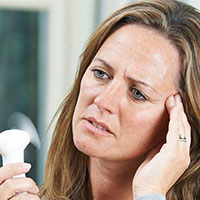Menopause and sex - what you need to know

It's rarely discussed - yet it's something that changes for a large number of women going through the menopause. If you're one of them, rest assured - you're absolutely not alone. In fact, a Gransnet survey found that almost a third of over 60s have lost their libido since the menopause. This change in your sex life can bring up many questions however, so here's our guide to menopause and sex, including some helpful tips from our wise gransnetters to try and add some passion back into your life.
Get more health advice delivered straight to your inbox...
Why does the menopause affect sex?
There are a number of reasons why menopause affects sex, namely those pesky hormonal changes that are responsible for many of the unpleasant side effects at this time of life. It could be that your libido has dropped due to a loss of hormones, sex has become painful or the other symptoms you may be experiencing, such as hot flushes, just really don't put you in the mood. It's common for these problems to occur, as these gransnetters found out:
"I felt as if someone flicked a switch when I turned 50. I wasn't allowed HRT because of high blood pressure. My doctor gave me Ovestin cream which I find helps a little. It's a shame that in your fertile years you can be put off by the worry of pregnancy. Once all that is over and you should be able to enjoy yourself, you no longer feel like it. I don't think that many men understand quite what we are going through and what the problem is."
"Although I had a very full and active sex life with my husband up to the menopause, which was at 54 for me, once I reached it my desire dried up more or less completely."
"I’m 63 and have suffered no loss of libido luckily, following menopause at 51. I find Sensilube, which you can buy from any chemist, perfectly adequate. What was horrendous was the perimenopause years with really heavy periods, hot flushes, profuse sweating and headaches - my libido definitely went off-kilter then."
Why does menopause get in the way of sex? In short, there are two main reasons - low libido and vaginal dryness (sometimes called atrophic vaginitis). During and after the menopause, women produce less oestrogen which can result in drier, thinner skin in the vagina and a loss of elasticity, so sex can often become painful as a result.
When it comes to low libido in women during menopause, hormones are to blame again. While testosterone is typically associated with males, females also produce a small amount of the hormone, and this has an impact on libido. Dropping levels of testosterone as women age, coupled with other symptoms of menopause - including depression, anxiety and insomnia - can have an understandable negative effect on women's sex drive during menopause.
Fear not though, as some women don't experience these problems at all. And, even if you do have have issues with sex after menopause, there are a number of ways to alleviate pain and keep your sex life active, happy and healthy.
Perimenopause and sex - can I get pregnant?
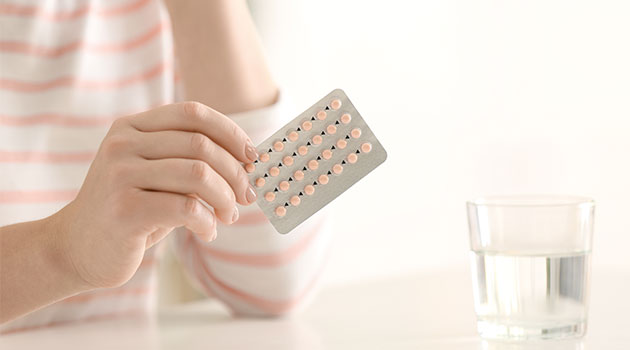
Perimenopause - the first stage of menopause - is when a woman begins to produce less oestrogen and signs of the menopause begin to occur. A woman's fertility will likely decrease in this period due to the declining levels of oestrogen, but you can still get pregnant while going through perimenopause - even if your periods are sporadic.
The general advice is to use contraception until you've not had a period for a whole year (when you reach postmenopause) if you're wanting to avoid pregnancy. If you're unsure whether you are perimenopausal or have questions about which contraception is the right option for you, talk to your GP for advice.
Loss of libido and vaginal dryness are also symptoms of perimenopause due to hormonal changes, so if you've not yet reached menopause but are experiencing these issues, it may be that perimenopause is to blame.
Join a community of like-minded people on Gransnet today
It's a common scenario: after going through menopause, you can finally have sex without the fear of an unwanted pregnancy. But, as many gransnetters have discovered, rather than entering a new stage of passion, there can sometimes be other factors that get in the way of a healthy sex life.
It may be that you've just lost interest or there could be a physical symptom that's putting you off, but it's completely normal to experience changes in your sex life during and after menopause. Here are three common reasons for bedroom issues and some solutions you can try to help. And, of course, if you are worried about anything, especially pain and bleeding, speak to your doctor.
1. Vaginal dryness and pain during sex
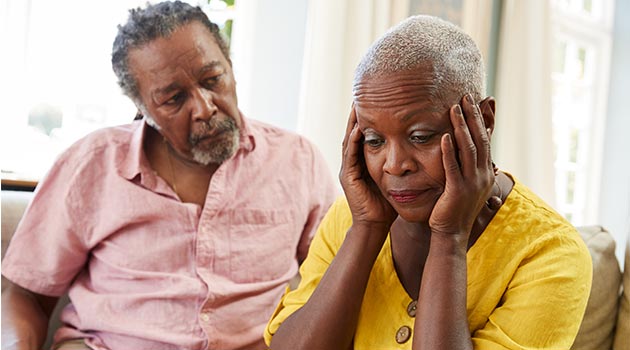
"I had my last period about three years ago (I'm nearly 54). It seems to be something I can't discuss with my girlfriends, but intercourse is now extremely painful to the point of being impossible. I have tried vaginal moisturiser but I don't think that's the issue."
- Consider HRT
"Five months on and I feel amazing, and no vaginal atrophy - thank God! I know that HRT isn't for everyone and some women can't take it, but for me it is nothing short of life-changing."
Hormone replacement therapy (HRT) replaces the lost oestrogen in your body, and therefore can help to lessen the severity of menopausal symptoms, including a dry vagina. However, HRT does have its drawbacks - including a heightened risk of certain types of cancer and strokes - but if you are suffering with other symptoms and it's affecting your daily life, it may be worth talking to a GP about your options. They will be able to inform you about the pros, cons, and whether it will be a suitable treatment for you.
- Invest in a decent lubricant
"I use YES vaginal gel (great name). This is a natural lubricant. I cannot have HRT for health reasons so I found this after a lot of research."
Dryness can be a major cause of pain during intercourse. We get that fumbling around with tubes and bottles isn't always exactly sexy, but once you get used to it you might even find very pleasurable ways of administering it. And don't forget too that, if penetration is uncomfortable, there are lots of other ways to enjoy intimacy.
- Don't be embarrassed to talk to your GP
"Oestrogen cream is great for this problem, I had no other menopausal symptoms so didn't feel the need for HRT, so just treated the one problem that was threatening my relationship. Painful sex is so difficult to discuss at first but your GP would have heard it all before, so go and have a word as it is so easily solved."
It's well worth a little short-term awkwardness to find a long-term solution. They might suggest pessaries or they might prescribe you an oestrogen gel or cream to ease the pain.
2. Loss of desire
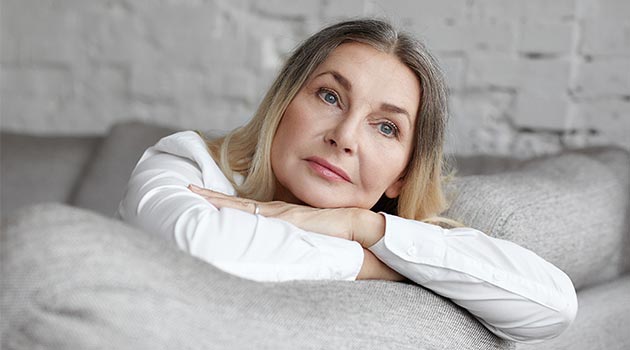
"My trouble is with low libido. It’s disappointing after having a high one for most of my life up until postmenopause."
- Do something spontaneous
Ah, go on! Try watching a racy film with your partner, or delve into some Mills & Boon-esque romance novels to give your libido a wake-up call. If time and budget allow, why not go away for a weekend? Maybe even a little role-playing if your adventurous streak will allow...
- Rediscover your own body
"Each to their own, nothing wrong with a bit of spice, some people find it easier to reach orgasm this way. Certainly a benefit if you live alone."
If your sex life has dwindled a little over the years, you might benefit from a bit of quality 'you time', so to speak... Reminding yourself of what you enjoy makes the leap to sharing intimacy with your partner again much more do-able.
- Give long-term relationships a shake-up
"Enjoy kissing and cuddling and show your love in other ways such as a bunch of flowers, a treat, a kind word or cooking a meal. Just have fun together."
Try scheduling some time in the week, or in the month if that feels more realistic, for intimacy, without focusing too heavily on sex itself. Choose a film to watch together, or head out for a candle-lit meal, then see where the night leads. Even if it doesn't lead to a heated night of passion, spending time together romantically can lead to feeling closer to your partner.
- Remember there is no 'normal'
"Your relationship is personal and you do what you are both happy with."
Feeling 'left behind' can be a common problem - but it's important that you remember that comparison often leads to unhappiness. What works for one person may not neccessarily work for you, and there is no set amount of sex that you should be having.
3. Self-esteem
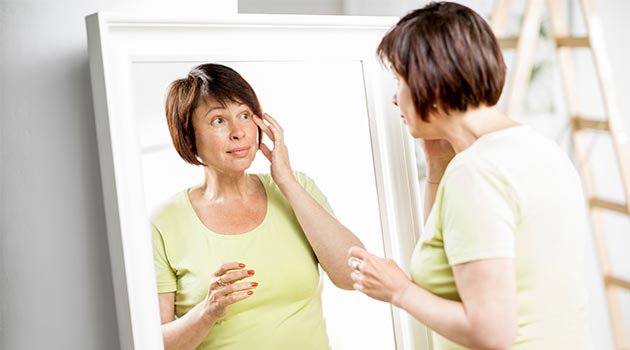
"I am experiencing hair loss and have about four bald patches. I didn't know that the menopause could be a cause of this and I am in the menopause now... It is making me lack confidence and is getting me down a lot."
- So much rests on how you perceive yourself
"It's easier said than done, but someone wise said to me: 'Make a list of 10 good things about yourself and when you are low return to it and re-read it.'"
Feeling unsexy does not mean you look unsexy. Try standing in front of the mirror and force yourself to notice the attractive things about yourself rather than the negatives, however small - and acknowledge them.
- Communicate with your partner
"Maybe you could each write down something you would enjoy, then give them a go? You might surprise each other (hopefully in good way!) and have a lot of fun in the process."
This one's important. There's a lot you can do to bolster yourself and your relationship by opening up and talking frankly with your partner. Emotional connections can secure sexual ones.
A word of warning
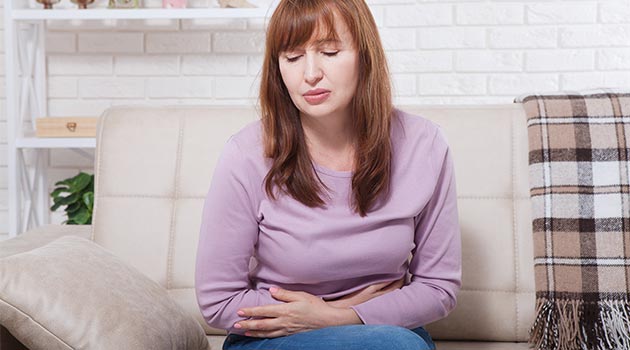
STIs
"Menopause is NOT protective against STIs. Sadly, there is an increasing incidence of STIs among older adults."
The common misconception is that sexually transmitted diseases aren't usual among older adults, but, in fact, STIs in people aged 50 to 70 are more prevalent than people often think.
One possible reason is that, with the menopause bringing an end to fertility, people are less concerned about protecting against unwanted pregnancies so stop using barrier contraception (e.g. condoms). Something to bear in mind, especially if you have a new partner. Remember also that some STIs are asymptomatic (which means you won't have any signs or symptoms of them), so it's important to get tested if there's a possibility that you may have been infected.
UTIs
"My main problem was dryness leading to frequent urinary tract infections, which needed antibiotics."
Urinary tract infections can become more common after menopause for these reasons:
- Hormonal changes affect genital's pH balance, which can cause irritation and infection.
- Naturally protective secretions decrease.
- The vaginal walls thin and penetration can irritate not only the vagina, but the nearby urinary tract and bladder.
Ways to avoid UTIs include gentle and frequent washing (NOT douching) with warm water or soap-free cleansers, drinking plenty of water and never wiping from back to front after using the toilet. Many find that drinking cranberry juice can help too. UTIs can bring more complications as we get older too, so it's important to follow NHS advice about contacting your doctor.
For more menopause advice, check out our dedicated forum.
Disclaimer: The information on our health pages is only intended as an informal guide and should not be treated as a substitute for medical advice. Gransnet would urge you to consult your GP before you undertake any treatment, or if you have existing health conditions and/or are taking medication.

Images: Shutterstock
Images: Shutterstock








